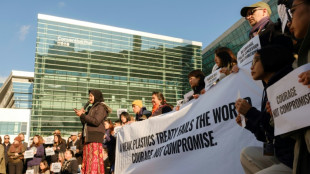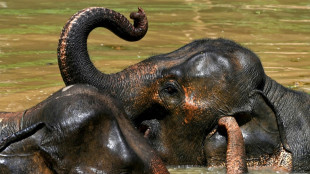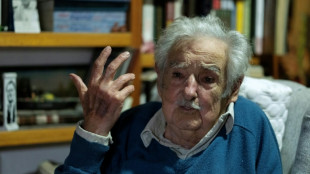
-
 Georgia arrests 107 more people as pro-EU protests continue
Georgia arrests 107 more people as pro-EU protests continue
-
Taiwan's Lai departs for US stopover during Pacific trip

-
 Kosovo raises security after blast, Serbia denies involvement
Kosovo raises security after blast, Serbia denies involvement
-
More than 122,000 people evacuated in Malaysia due to floods

-
 Vietnam to build $67 bn high-speed railway
Vietnam to build $67 bn high-speed railway
-
Nations warn of deadlock at landmark plastic pollution talks

-
 Taiwan's Lai departs on Pacific island tour
Taiwan's Lai departs on Pacific island tour
-
Syria war monitor says rebels control 'most of' Aleppo city

-
 Greenpeace activists board tanker in plastic protest
Greenpeace activists board tanker in plastic protest
-
Floods displace 122,000 people in Malaysia

-
 Taiwan's Lai set to depart on Pacific island tour
Taiwan's Lai set to depart on Pacific island tour
-
American Johnston reels in Herbert at Australian Open

-
 Hawks top Cavs again to advance in NBA Cup, Boston beat Bulls
Hawks top Cavs again to advance in NBA Cup, Boston beat Bulls
-
South Korea star Jung Woo-sung apologises after baby scandal

-
 Romania's economic troubles fuel far-right rise
Romania's economic troubles fuel far-right rise
-
England on verge of wrapping up first New Zealand Test

-
 Icelanders head to the polls after government collapse
Icelanders head to the polls after government collapse
-
England strike twice to have New Zealand in trouble in first Test

-
 Researchers analyse DNA from dung to save Laos elephants
Researchers analyse DNA from dung to save Laos elephants
-
North Korea's Kim, Russian minister agree to boost military ties

-
 Brook's 171 gives England commanding 151-run lead over New Zealand
Brook's 171 gives England commanding 151-run lead over New Zealand
-
Kamala's coda: What's next for defeated US VP Harris?

-
 Chiefs hold off Raiders to clinch NFL playoff berth
Chiefs hold off Raiders to clinch NFL playoff berth
-
Australia's Hazlewood out of 2nd India Test

-
 Trudeau in Florida to meet Trump as tariff threats loom
Trudeau in Florida to meet Trump as tariff threats loom
-
Jihadists, allies breach Syria's second city in lightning assault

-
 Trudeau in Florida to meet Trump as tariff threats loom: media
Trudeau in Florida to meet Trump as tariff threats loom: media
-
Hunter shines as Hawks top Cavs again

-
 Southampton denied shock Brighton win by dubious VAR call
Southampton denied shock Brighton win by dubious VAR call
-
Alarm over high rate of HIV infections among young women, girls

-
 Swiss unveil Euro 2025 mascot Maddli
Swiss unveil Euro 2025 mascot Maddli
-
Bears fire coach Eberflus after latest agonizing NFL defeat

-
 Rallies mark one month since Spain's catastrophic floods
Rallies mark one month since Spain's catastrophic floods
-
Arnault family's Paris FC takeover completed

-
 Georgian police stage new crackdown on pro-EU protestors
Georgian police stage new crackdown on pro-EU protestors
-
'We're messing up:' Uruguay icon Mujica on strongman rule in Latin America

-
 Liverpool dealt Konate injury blow
Liverpool dealt Konate injury blow
-
Van Nistelrooy appointed Leicester manager

-
 Verstappen brought back to earth in Doha after F1 title party
Verstappen brought back to earth in Doha after F1 title party
-
Global wine output to hit lowest level since 1961

-
 Norris boosts McLaren title hopes with sprint pole
Norris boosts McLaren title hopes with sprint pole
-
Big-hitting Stubbs takes satisfaction from grinding out Test century

-
 Romania recounts presidential ballots as parliamentary vote looms
Romania recounts presidential ballots as parliamentary vote looms
-
French skipper Dalin leads as Vendee Globe passes Cape of Good Hope

-
 Chelsea not in Premier League title race, says Maresca
Chelsea not in Premier League title race, says Maresca
-
Brazil's Bolsonaro aims to ride Trump wave back to office: WSJ

-
 France requests transfer of death row convict held in Indonesia: minister
France requests transfer of death row convict held in Indonesia: minister
-
'Mamie Charge': Migrants find safe haven in Frenchwoman's garage

-
 Iconic Uruguayan ex-leader hails country's swing left as 'farewell gift'
Iconic Uruguayan ex-leader hails country's swing left as 'farewell gift'
-
Thousands rally in Georgia after violent police crackdown on pro-EU protesters


'Guayakill': Ecuadoran port city torn apart by gangs
Entire neighborhoods run by gangs, prison bloodbaths and police overwhelmed by criminal firepower: Drug trafficking has transformed the Ecuadoran city of Guayaquil into a den of violence.
The port city of 2.8 million people, which on Saturday hosts the final of the Copa Libertadores competition, has witnessed scenes of incredible barbarity in recent years.
Hundreds of inmates have been killed -- many beheaded or incinerated -- in numerous prison battles, and civilians have increasingly gotten caught up in the gang war rocking the city rebaptized "Guayakill" by inhabitants.
So far this year, the commercial heart of Ecuador has seen 1,200 murders -- 60 percent more than in 2021 according to official data.
Since last year, almost 400 inmates have died in several cities, most of them in Guayaquil, which has also been hit by a spate of car bombs and shocking scenes of bodies dangling from bridges.
And despite the government declaring states of emergency to allow for troop deployment and boosting police numbers in Guayaquil by over 1,000 to nearly 10,000, some fear it is a losing battle.
"We used to confront small arms... revolvers. But now on the streets we face American (automatic) rifles, grenades, explosive devices," police forensics official Luis Alfonso Merino told AFP.
"The violence has grown enormously."
- Rifles, grenades -
Once a relatively peaceful neighbor of major cocaine producers Colombia and Peru, Ecuador was long merely part of the drug transit route.
But recently, traffickers with suspected links to Mexican cartels such as Sinaloa, the Gulf Clan and Los Zetas have been expanding their domestic presence -- fighting over the fast-growing local market and access to the port of Guayaquil for exports to Europe and the United States.
The city's prisons, where gangs also battle it out for supremacy, are emblematic of the fast-declining security situation.
In one of the deadliest riots in Latin American history, 122 people were slaughtered at the infamous Guayas 1 penitentiary in September last year in an hours-long rampage by inmates wielding guns, machetes and explosives.
"The State does not govern the prisons," Billy Navarrete of the CDH human rights NGO told AFP.
Instead, they are under the control of "criminal organizations with the complicity of law enforcement agents who allow, tolerate and enrich themselves with arms trafficking," he said.
The government has announced it was stepping up enforcement. In 2021, it reported a record haul of 210 tons of drugs.
So far this year, the figure stands at 160 tons.
In a 2019 report, Ecuadoran intelligence said there were at least 26 criminal gangs fighting for control of the lucrative drug market, but officials have since said the number is likely higher.
And according to operations chief Major Robinson Sanchez in Guayaquil, the gangs are "better armed than the police."
- Wolves vs Eagles -
At the entrance to Socio Vivienda II, an impoverished housing development and one of the most dangerous places in Guayaquil, police and soldiers stand guard.
Two dozen others in black uniforms, bulletproof vests and balaclavas patrol the narrow streets on motorcycles.
Some 24,000 people live in Socio Vivienda's three sectors in the crossfire of the gang war that has resulted in several public shootouts since 2019 and forced school closures in recent weeks.
The gangs go by names such as Lobos (Wolves) and Tiguerones. The Aguilas (Eagles) are based higher up on the hill.
When the groups first started going head to head, the community itself erected metal gates at the ends of streets to prevent gang members from moving freely about.
But police removed these for ease of access, and now "the bullets zoom from one end to the other," said a community leader, 45, who spoke on condition of anonymity in an atmosphere of fear.
- 'Zombies' and sentinels -
Patrolling officers stop at a house in Socio Vivienda and enter by force.
They find no drugs, only three youngsters with "Tigueron" tattooed onto their arms. It is not enough to detain them.
The gangs use children as young as 10 as sentinels or informants, residents and police say.
As they "rise" in the organization, they earn the right to get tattooed -- but not without having committed a crime.
On the streets, it is common to see doped-up consumers of "H" -- a heroin residue sold for 25 cents per gram. They are known locally as "zombies."
The community leader told AFP that luxury vehicles moved in and out freely, transporting drugs right under the noses of police.
And as fearful families leave the neighborhood, gang members immediately "move in" to their homes, he added.
So far this year in Socio Vivienda II alone, records show 252 killings, up from 66 in 2021.
On the weekend preceding Saturday's Libertadores clash between Brazilian teams Flamengo and Athletico Paranaense, 21 murders were reported in Guayaquil.
Some 50,000 foreign fans are expected to turn out for Saturday's final.
G.Schulte--BTB
